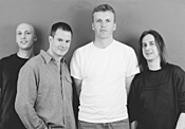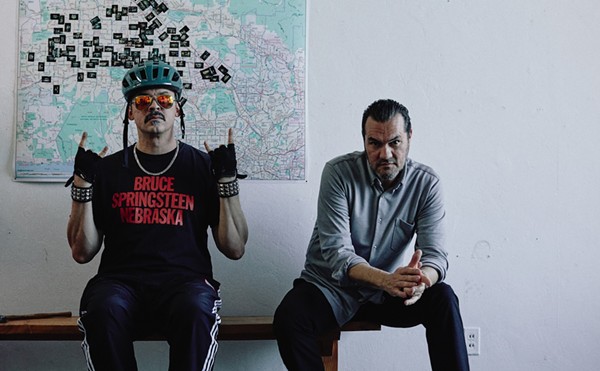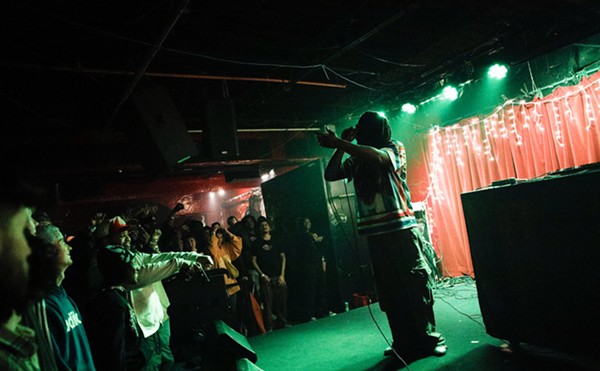Some of the best of the Celtic rock genre -- those who combine traditional and modern sounds -- will visit the Cleveland area this month. Following are a few worth making plans for.
Seven Nations
There's always been something . . . ambitious about Seven Nations. From its boldly inclusive name, which refers to the seven nations of the traditional Celtic world, to its signature sound, a rich -- at times nearly orchestral -- blend of guitar-driven rock, with fiddles soaring above or bagpipes marching alongside, the band seems intent on being the best in the genre.
Of course, the Irish are notorious for reminding each other of their place, and in that spirit we wonder whether the Florida band's ambitions are pulling it away from its roots. The title of its last release, 2002's And Now It's Come to This, suggests a departure, and the songs seem to confirm it: The opening track, "You'd Be Mine," features a Cars-like keyboard hook and nary a peep from the band's world-class pipers. (In fact, the traditional instruments are relegated to cameo appearances, often on the outside looking in at polished, unethnic, radio-friendly tunes.)
Still, most of the songs are quite good, if earnest, and frontman Kirk McLeod's lyrical prowess has improved. Besides, ragging on musicians for expanding their horizons is rather punk, isn't it?
Saturday, March 6, at the Odeon.
The Saw Doctors
You could make a case for excluding the Saw Doctors from the Celt-rock category. Though hailing from the largely rural west of Ireland, the band's sound owes more to American classic rock than to traditional Irish. Fiddles, pipes, and accordions are used sparingly. But lyrically -- and spiritually, you might say -- the Saw Doctors are the most Irish rock band in the world.
They've been compared to Springsteen, as much for the obvious geopolitical influences as for their sound. New Jersey is to Springsteen what Ireland is to the Saw Doctors: not just home, but the setting for songs about longing and simple pleasures and struggles and pride -- themes that resonate with commoners everywhere. There's also an undercurrent of uncertainty in their lyrics that American boomers would find familiar, the nagging sense that something intangible but important was lost amid the social and technological advances of the last few decades.
They're at their best, however, when they're having fun. Their biggest hit -- in fact Ireland's biggest single ever -- "I Useta Lover," is a rollicking, countrified send-up of love songs: "I useta see her up the chapel when she went to Sunday mass/And when she'd go to receive, I'd kneel down there/And watch her pass/The glory of her ass."
Friday, March 12, at the Agora.
The Tossers
There was talk that the Grog Shop might host an appearance by Spider Stacey of the late, great, punk-folk band the Pogues, but this did not come to pass. Instead, it gets a rare visit from the Tossers, and no mere consolation prize is that. The Chicago-based seven-piece combines the acoustic ferocity of Flogging Molly with the working-class politics of the Dropkick Murphys, but cranks up both several notches, achieving a sonic and lyrical intensity few others even try to match.
Lead singer Tony Duggins doesn't sing so much as rant semi-melodically, in an unapologetically coarse voice that works brilliantly with the band's rough, mandolin-heavy sound. (The Tossers are arguably the most direct descendants of the Pogues.) They're remarkably adept at conveying the hardship and heartache that's long been part of life for the Irish, at home and abroad. "Wedding," from the 2000 album Long Dim Road, is a surprisingly touching love song, set amid the struggle of one rural Irish family against abject poverty. But even when they're wallowing, there's a wonderful fuck-you spirit in Tossers songs, a celebration of the nobility amid degradation that saw the Irish through centuries of oppression.
If you can catch just one of these shows, make it this one.
Monday, March 15, at the Grog Shop.
Slainte Mhath
Don't be fooled by the imposing Gaelic name (pronounced "slawncha va," which means "good health to you"). Cape Breton's Slainte Mhath plays traditional Irish music -- in a manner of speaking. The band shows gleeful disrespect for the genre's time-honored rules, like the ones against disco-era handclaps and wacka-wacka-wah-wah guitar riffs; oblique, spoken, synthed-up "lyrics" like "I want to dance in my new pants"; and vocal imitations of melodies recorded through telephones. If They Might Be Giants hijacked the Chieftains, they might come up with something like Va, the band's second CD, released in 2002.
That's not to say it's all gimmickry. There's impressive traditional musicianship afoot throughout Va, courtesy of two fiddlers and a bagpiper. But it's the way those instruments are layered with guitars, drums, and keyboards that makes Slainte Mhath's music more, well, fun.
Wednesday, March 17, at The Spot, Case Western Reserve University.
The Prodigals
We've never quite understood the Prodigals' slogan "jig-punk." In addition to being somewhat misleading -- over three albums, we've yet to hear punk influences -- it's a limiting way to describe such a versatile and tight band.
The Prodigals' unusual dual-frontman arrangement makes for an unusual dual-band experience. Accordion player Greg Grene and guitarist Eamon O'Tuama rotate lead vocals -- Grene handling the upbeat, traditional-leaning tunes and O'Tuama tackling the harder stuff. Keeping the family together are bassist Andrew Harkin and drummer Chris Nicolo, the finest rhythm section in Celtic rock.
Friday, March 19, at the Beachland Ballroom.
Great Big Sea
Like Seven Nations, Newfoundland's Great Big Sea tends to limit the Celtic elements of its sound to certain songs. Between 1998's Rant and Roar, the band's first CD to be released in the States, and the just-released Something Beautiful, the Celtic influences seemed to lose some ground to the upbeat folk-rock style of most of the band's originals. But it would be unfair to suggest that this is a bad thing. There's a vaguely R.E.M.-like quality to their songs (minus the Athens boys' sometimes sloppy guitar work and incomprehensible lyrics) as well as a relentless, infectious optimism. And they can still knock traditional covers -- and traditional-sounding originals, like "Helmethead," the story of a womanizing journeyman hockey goon -- out of the park.
Wednesday, March 24, at the Odeon.














